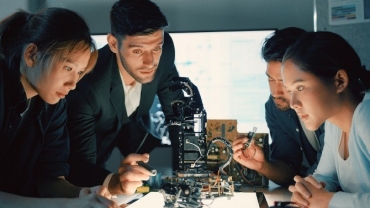

“People need to get super clear on what problems they're trying to solve with AI”: Katy Wigdahl, Speechmatics
Why AI has gone “technicolour on steroids,” creating the conditions for UK tech growth, and moving from hype cycle to value creation.
“The acceleration has been relentless,” says Katy Wigdahl, CEO of Speechmatics, a Cambridge-based AI firm focused on building speech technology. She is describing the growth in AI as having “gone from black and white, to totally technicolour on steroids.”
However, Wigdahl recently returned from a heavily AI-centric Consumer Electronics Show (CES) in Las Vegas, and in keeping with the best traditions of its host city, says there remains an air of style over substance with some AI that was on show.
“There is so much excitement around AI,” she says. “But there is also a lack of understanding about what businesses should be trying to get out of it. It’s classic hype cycle stuff.”
“People need to get super clear on what problems they're trying to solve with AI, what use cases they are focusing on, who their audience is, what those demographics want and how they bring their people along on the journey with them.”
With Speechmatics’ technology supporting the wave of innovation within agentic AI, Wigdahl doesn’t doubt the impact AI will have, but she is more interested in the value it can create than the hype it incites.
She attributes this pragmatism in part to growing up surrounded by the last technology to truly change the world. Her father worked alongside Tim Berners-Lee at CERN, developing the World Wide Web. That set a high bar, at an early age for what it would take to “wow” Wigdahl.
Positive change and problem solving – at speed
Speechmatics’ speech technology supports applications ranging from transcription to live broadcast captioning and real-time translation.
The company works across industries including education, healthcare and media. It also works with third parties to embed its APIs and technology into call centre, virtual meeting and unified comms technologies. And, as speech becomes an increasingly common interface in cars, televisions, watches and a host of other devices, it is partnering to embed into GPUs and cloud services.
But while the company is well-established in its space, Wigdahl is aware it is a highly competitive market populated by very large players.
“We've always been at the forefront of speech,” says Wigdahl. “But in many ways, that isn't enough. We have to reinvent ourselves, add more and solve problems others are unable to.”
“Historically we've been focused on what was said. But the next thing is who said it and how was it said. Additionally, we don’t just want to be the best ears of AI, but also the best voice too. When you bring all those together, you get richness of conversation and depth of understanding. In a world in which there is going to be constant human-to-machine interaction, it's got to be human-like, natural and seamless.”
Wigdahl believes sophisticated speech technology will transform organisations and the way they empower their people, and better serve their customers. She also sees significant societal benefits.
“Our mission is to understand every voice. We want to make sure that regardless of ethnicity, age or disability every single person can access and engage with AI-driven tech.”
That sense of “mission”, as well as the opportunity to work at the leading edge of innovation, is central to how Speechmatics recruits and retains talent, says Wigdahl.
“We're based in Cambridge, but we also have offices in London. That gives us a stream of super strong graduates bringing fresh thinking.”
Wigdahl knows US tech giants are also eyeing that talent. But that is the backdrop for every scale-up in the tech industry, and as such the pragmatist in Wigdahl focuses on what she can influence, rather than what she can’t.
“The best thing I can do is create an environment where people want to work, where they believe in the purpose and values and have a stake in the business.”
Creating the climate for UK innovation
However, Wigdahl says “recent curveballs”, including changes to R&D tax credits and the increase in employers’ National Insurance contribution have made it more challenging for UK technology businesses to compete, particularly with US giants in an industry where innovation is both essential and expensive.
“In the AI space, engineers are very expensive, and GPUs are very expensive, so there's a tension between innovation, which means investment and accepting a level of burn, and going for profitability, but accepting you're not heavily investing.”
Closer collaboration between businesses and Government could help create the conditions for greater UK innovation and GDP growth, says Wigdahl. It would also help with other challenges that require a collaborative solution, such as addressing the carbon footprint of data centres, related to the huge compute power needed for AI.
“We are as efficient as we can be, in part because we don’t have endless amounts of money to spend on compute power,” she says. “But we all have a role to play in creating greater efficiency, using renewables and getting the best out of the grid.”
Wigdahl has found herself invited to Downing Street and the Houses of Parliament to discuss such topics and hopes those invites are a sign that greater collaboration will drive the growth of a more sustainable, vibrant and technicolour UK technology sector.
28th UK CEO survey
Read full findings
CEO interviews: Exclusive insights from UK business leaders
Explore what leading UK CEOs have to say about their business plans and priorities.

Frances Russell,
Absolute Collagen

Lynn Perry,
Barnardo’s

Natalie Campbell,
Belu Water

Andy Gregory,
BGF

Paul Flaum,
Bourne Leisure

Sean Doyle,
British Airways

Shobi Khan,
Canary Wharf Group

James Bradley,
Churchill Group

Samantha Graham,
Clean Sheet

Mike Norris,
Computacenter

Jill Popelka,
Darktrace

Jo-Jo Hubbard,
Electron

Hatul Shah,
Sigma Pharmaceuticals Group

Katy Wigdahl,
Speechmatics

Nadeem Boghani,
Splendid Hospitality

Alistair Phillips-Davies,
SSE

Nicola Shaw,
Yorkshire Water

Jenny Walton,
Refugee Employment Network
Contact us










